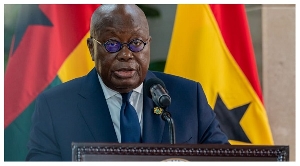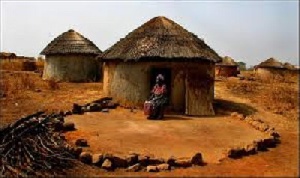- Home - News
- TWI News | TV
- Polls
- Year In Review
- News Archive
- Crime & Punishment
- Politics
- Regional
- Editorial
- Health
- Ghanaians Abroad
- Tabloid
- Africa
- Religion
- Election 2020
- Coronavirus
- News Videos | TV
- Photo Archives
- News Headlines
- Press Release
Sports Features of Wednesday, 8 January 2020
Source: Fiifi Anaman
On the Appiah reign and Sankofa
James Kwasi Appiah’s contract as Ghana coach expired last month, and given the GFA’s dissolution of the Black Stars’ technical team last week, as well as his thank you note, it is safe to say that the divorce is complete.
The 60 year old had two stints (2012-2014, 2017-2019) at the helm, taking charge of almost a half century of games.
In terms of tournaments, Appiah was unsuccessful, not least per the team’s standards. He placed 4th at Afcon 2013. He got eliminated in the First Round of the 2014 World Cup.
He reached the Round of 16 at Afcon 2019 (Ghana had reached at least the semi final of six successive Afcons before this).
Also, and this is not mentioned a lot, while many blame Avram Grant for having botched up Ghana’s qualification to the 2018 World Cup, I believe Appiah could have launched a mid-season qualification bid, but he was not consistent enough to achieve that.
There were highs, though. Qualifying for the 2014 World Cup (becoming the first indigenous Ghanaian coach to achieve that). Beating African giants Egypt 6-1 in October 2013. Drawing 2-2 with eventual World champions Germany at the 2014 World Cup.
Managing to significantly improve Ghana’s goalscoring (Appiah’s team averaged almost 2 goals per competitive game during his tenure).
Appiah’s eye for talent also brought (now) team regulars like Christian Atsu and Mubarak Wakaso into the Black Stats fold. Over the years, the likes of Majeed Waris, Caleb Ekuban, Lumor Agbeyenu, Ebenezer Ofori, Raphael Dwamena and many others were also introduced by Appiah and impressed when handed opportunities.
Appiah was a strange case. As accomplished as he was as a footballer (Afcon gold medal in 1982 and silver medal in 1992 with Ghana, Africa Cup in 1983 with Kotoko, and a former national team captain) he was still seen, largely, as someone who did not “know” football. Perhaps his inarticulate nature and meek demeanor inspired this false impression of cluelessness.
He was quiet, and that for many meant that he neither had confidence nor authority. Bottom line was, he was never rated by the majority of Ghanaian football fans, who draped his reign in ridicule.
He did his best, yet, you got the sense that many felt Appiah was not an elite coach. But here’s the thing: were we - a nation that does not put enough effort into deliberately grooming local tacticians and giving them opportunities at the top - expecting him to be elite? Were we expecting to reap what we hadn’t sown?
Appiah may not have impressed many, but his very occupation of that role - not so much his performance during occupation as period of occupation - was significant for the empowering of local expertise. In the last 17 years, 9 coaches manned the Black Stars substantively, and among them, Appiah was the only Ghanaian.
Indeed, with a cumulative tenure of about four years, Appiah also happened to be the longest serving coach within this same period. So unusual was the Appiah’s longevity, especially weighed against his unpopularity, that it led to many subscribing to rumours that his appointment and retention was masterminded by forces outside of football. But forget all this.
In hindsight, Kwasi Appiah as Ghana coach, occurring the way it did, right in the midst of the culture of foreign obsession, was almost miraculous. It was also something we needed.
Call me old school, but Ghana needs to revisit the golden era of the 50s and 60s, where systems were put in place to make sure the national team not only represented an exhibition of the finest GHANAIAN footballers, but the finest GHANAIAN coaches as well. If a nation cannot import footballers to represent it, why should it import a coach?
It is preposterous not to have a reliable supply of local coaching talent for the national team 60 years after the Black Stars was formed - 62 years after independence.
Kwasi Appiah did not impress you? That’s fine. But how will any other indigenous Ghanaian coach ever impress you if nothing is being done to make them impressive; if nothing is being done to hand them opportunities to learn and grow?
It is considered uncool these days to be a believer of local potential in terms of coaching.
Some find it unrealistic, others unintelligent. But what is more uncool than depriving your own people of opportunities to develop themselves in order to ultimately sell the nation’s capabilities to the world?
What is more unrealistic than having a Ghana national team led by an ‘unGhanaian’ coach? What is more unintelligent than the the lazy resort to Serbians or the splashing of cash on average Western trainers?
And let us not talk about “success” - all the Black Stars’ major achievements have been delivered by men born in Okorase and Agona-Nyakrom, and not Belgrade or Jerusalem.
National team football, unlike club football, is a different breed; it is an avenue to showcase what a nation has, to make do with what a nation can call their own. Success, while craved, is not exactly an imperative - at least to the level of “buying” it.
By all means consult the West, for we need to learn from the best, but we also need to recognize the value of building our own, of aspiring for our own to become as sophisticated or world class. And we need to be deliberate about this process, and more importantly, tolerant about the challenges it brings and patient about the time it takes.
Let us put in the work. I really hope the Appiah era represents a turning point.
Appiah’s record (2012-2014, 2017-2019)
Games played: 49
Wins: 24
Draws: 14
Losses: 11
Goals scored: 92
Goals against: 44











